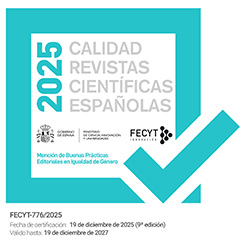Interspecies Mothering in the Anthropocene: Discourse of Transcorporeality and Matricentricity in Charlotte McConaghy’s Migrations and Barbara Kingsolver’s Flight Behaviour
DOI:
https://doi.org/10.17561/grove.v31.8488Keywords:
ecological mothering, multispecies motherhood, anthropogenic crisis, climate justiceAbstract
The research paper aims to disrupt the dominant anthropocentric notions of motherhood that focuses on the multigenerational praxis of human to human relationships, and instead sheds light on the ecological motherhood, that accommodates diverse relationships between women and the more than human. This hetero-patriarchal reading challenges anthropocentric personhood and transitions towards the motherhood in anthropogenic narratives like Migrations and Flight Behaviour that perceives motherhood as multispecies inclusive and transcorporeal. The novels deal with ecological mothering that enables the mothers as well as their children- Arctic Terns in Migrations and Monarch Butterflies in Flight Behaviour, in survival and sustenance. The mothering offered by the women in the climate narratives radically debunks the process of ‘othering’ of the more than human by putting forth ‘other-mothering’ (Collins and Michaels) that promotes cohabitation and multispecies justice. The paper will further investigate the emotional and ecological praxis of motherhood amidst the anthropogenic toxification of global warming, species extinction and relocation. The Motherhood environmentalism by Dellarobia in Flight Behaviour and Franny in Migrations will be scrutinised as a call for kinship and multispecies justice.
Downloads
References
Abram, D. The Spell of the Sensuous. Vintage, 2012.
Animal Research Network Editorial Collective. Animals in the Anthropocene: Critical Perspectives on Non-Human Futures. Sydney University Press, 2015. http://ebookcentral.proquest.com/lib/britishcouncilonline-ebooks/detail.action?docID=4585607.
Baldwin, A., C. Fröhlich and D. Rothe. From climate migration to anthropocene mobilities: shifting the debate. Mobilities, 2019, vol.14, no.3, pp. 289-297, http://doi.org/10.1080/17450101.2019.1620510
Barnett, J. Imagining More-Than-Human Care: From Multispecies Mothering to Caring Relations in Finding the Mother Tree. Journal of Ecohumanism, 2023, vol. 2, http://doi.org/10.33182/joe.v2i1.2861
Bladow, Kyle and Jennifer Ladino. Affective Ecocriticism: Emotion, Embodiment, Environment. Unp Nebraska, 2018.
Buell, L. The Future of Environmental Criticism: Environmental Crisis and Literary Imagination. Blackwell, 2008.
Bradley, J. Ghost Species. London, Hodder & Stoughton, 2022.
Chang, S. Multispecies Justice. Durham, Duke UP, 2023.
Chao, Sophie, et al. The Promise of Multispecies Justice. Duke University Press, 2022.
Clark, Timothy. Ecocriticism on the Edge: The Anthropocene as a Threshold Concept. Bloomsbury Academic, An Imprint of Bloomsbury Publishing, 2016.
Cousins, E. M. Mobilizing Motherhood: The Gendered Burden of Environmental Protection. Sociology Compass, vol. 15, no. 5, April 2021, https://doi.org/10.1111/soc4.12879
Cunsolo, A., and K. Landman. Mourning Nature: Hope at the Heart of Ecological Loss and Grief. Montreal, McGill-Queen's UP, 2017.
Gillespie, S. Climate Crisis and Consciousness. London, Routledge, 2019.
Hartigan, J. Critical perspectives on multispecies ethnography — a ... - somatosphere. Multispecies vs Anthropocene, Dec. 2014. http://somatosphere.net/2014/critical-perspectives-on-multispecies-ethnography-a-special-issue-of-critique-of-anthropology.html/
Jalan, S. “Sense of place and sense of planet”: Local-planetary experiences of climate change in Barbara Kingsolver’s Flight Behaviour. Rupkatha Journal on Interdisciplinary Studies in Humanities, 12 (5), 2020. https://doi.org/10.21659/rupkatha.v12n5.rioc1s10n5
Kirksey, S. E. and S. Helmreich. The Emergence of Multispecies Ethnography. Cultural Anthropology. vol. 25, no. 4, 13 Oct. 2010, pp. 545–576. https://doi.org/10.1111/j.1548-1360.2010.01069.x
Kingsolver, B. Flight Behaviour. London, Faber and Faber, 2013.
Logsdon-Conradsen, Susan C., and Sarah L. Allred. Motherhood and Environmental Activism: A Developmental Framework. Ecopsychology, vol. 2, no. 3, 2020, pp. 141-146. https://doi.org/10.1089/eco.2010.0027
MacGregor, S. Beyond Mothering Earth. Vancouver, UBC Press, 2011.
McConaghy, C. Migrations. New York, Flatiron Books, 2021.
Mehnert, A. Climate Change Fictions: Representations of Global Warming in American Literature. Cham, Springer International Publishing, 2016.
Morton, T. Ecology without Nature: Rethinking Environmental Aesthetics. Cambridge, Harvard UP, 2009.
Murray, J. Women Navigating the Climate Catastrophe: Challenging Anthropocentrism in Selected Fiction. Journal of Literary Studies, vol. 37, no. 3, 2021, pp. 15–33. https://doi.org/10.1080/02564718.2021.1959760.
O’Reilly, A. Encyclopedia of Motherhood. Vol. 2. Thousand Oaks, California Sage Publishing, 2010.
Pascoe, C. Chapter 2: Literature Review. Theories of Motherhood and Motherhood in Film. SES Home Page, University of Sydney, 1998. https://ses.library.usyd.edu.au/bitstream/2123/
Simard, Suzanne. Finding the Mother Tree: Discovering the Wisdom of the Forest. Knopf, 2021.
Thomas, Mariko O. Bodies like Bodies: Multispecies Motherhood in theAnthropocene. Communicating in the Anthropocene, 2020.
Wallace-Wells, D. The Uninhabitable Earth: Life after Warming. London, Tim Duggan Books, 2019.
Published
Issue
Section
License
Copyright (c) 2024 V. Janane

This work is licensed under a Creative Commons Attribution 4.0 International License.
Authors who publish with this journal agree to retain copyright and grant the journal right of first publication with the work simultaneously licensed under a Creative Commons Attribution License that allows others to share the work with an acknowledgement of the work's authorship and initial publication in this journal. Also, authors will retain the rights on their work, even if they will be granting The Grove. Working Papers on English Studies a non-exclusive right of use to reproduce, edit, distribute, publicly communicate and show their work. Therefore, authors are free to engage in additional, independent contracts for non-exclusive distribution of the works published in this journal (such as uploading them to an institutional repository or publishing them in a book), as long as the fact that the manuscripts were first published in this journal is acknowledged.

























